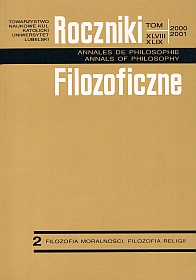Etyka a eudajmonologia
Abstrakt
Along the history of ethics there is a controversy concerning the subject-matter of ethics itself − is it focused on the ways of fulfilling one's life (happiness) or is it the normative theory of the moral duty? The author of the paper takes into considerations three concepts of ethics which were developed by Aristotle, St. Thomas Aquinas and Antonio Rosmini.
The classical model of replacing ethics by eudaimonology is presented by Aristotle. Eudaimonism is connected in his philosophy of the human praxis with conceiveing of good in terms of the end of human action (teleological concept of good). Eudaimonia consists in fulfillment of the human life as a whole. Therefore the ultimate end of the human life is understood as the immanent end of the human nature. Aristotle identifies the moral good with the good of the human nature (natural fallacy in ethics).
On the one hand the ethics of St. Thomas is dependent on the eudaimonistic views of Aristotle and on the other hand it goes beyond naturalism by pointing out the transcendent ultimate end of the human life which is idendified with God. In his theological thought St. Thomas Aquinas seeks to develop personalism. The good of person is the reason for an attitude of love on which the community of persons is founded. Because of the presence of the eudaimonistic and personalistic elements the ethics of Aquinas remains metodologically inconsistent.
Antonio Rosmini thanks to his inspiration by the ethical thought of I. Kant distinguishes two diffrent practical sciences: eudaimonology and ethics. He refuses, however, Kantian apriorism and acognitivism. The moral duty is justified by the data of the moral experience. For the essence of morality consists in recognition of a being in accordance with its axiological order. Eudaimonology deals with the subjective good which is related to the nature of subject and only ethics discovers the moral obligation of affirming good for its own sake (objective good).
Bibliografia
Arystoteles: Etyka nikomachejska, tłum. D. Gromska, w: Dzieła wszystkie, t. V, Warszawa: Wydawnictwo Naukowe PWN 1996.
Cooper J. M.: Reason and Human Good in Aristotle, Indianapolis: Hackett Publishing Company 1975.
DelNoce A.: L'epoca della secolarizzazione, Milano: Giuffré 1971.
Gilson E.: Saint Thomas moraliste, Paris: Vrin 1974.
Höffe O.: Ethik und Politik. Grundmodelle und -probleme der praktischen Philosophie, Frankfurt am Main: Suhrkamp Verlag 1979.
Höffe O.: Aristoteles, München: Verlag C. H. Beck 1996.
Maritain J.: La philosophie morale. Examen historique et critique de grands systèmes, Paris: Éditions Gallimard 1960.
Papadis D.: Die Rezeption der Nikomachischen Ethik des Aristoteles bei Thomas von Aquin. Eine vergleichende Untersuchung, Frankfurt am Main: Rita G. Fischer Verlag 1980.
Rosmini A.: Zasady etyki, tłum. A. M. Wierzbicki, Lublin: Towarzystwo Naukowe KUL 1999.
Spaemann R.: Szczęście i życzliwość. Esej o etyce, tłum. J. Merecki SDS, Lublin: Redakcja Wydawnictw KUL 1997.
S. ThomaeAquinati s: In decem libros Ethicorum Aristotelis ad Nicomachum Expositio, Taurini−Romae: Marietti 1949.
S. ThomaeAquinati s: Summa theologica, I-III, Taurini 1939.
Wierzbicki A.: Problem realizmu w etyce Antonio Rosminiego, „Roczniki Filozoficzne”, 47(1999), z.2, s. 353-367.
Copyright (c) 2001 Roczniki Filozoficzne

Utwór dostępny jest na licencji Creative Commons Uznanie autorstwa – Użycie niekomercyjne – Bez utworów zależnych 4.0 Międzynarodowe.





